Unit 2 Book 7单词 学案
Unit2 寒假词汇、短语、句型与语法综合复习学案 2021-2022学年 人教版英语八年级上册

Unit 2 词汇、短语、句型与语法综合复习一.语法巩固一.语法性单项选择1.It's ________ for me to do it by myself. I can ________ finish it on time. A.hard; hardly B.hard; hard C.hardly; hardly D.hardly; hard2.I________eat ice-cream. I don't want________fat. A.always; to be B.usually; to be C.never; to be3.—______ do you go home a month? —Once. A.How often B.How many times C.How long D.How far4.He loved playing baseball and practiced ________ in the past. However, he ________ plays it now. A.hardly; hard B.hard; hardly C.hardly; hardly D.hard; hard5.—How often do you watch soap operas? —_________. I’m not interested at all. A.Usually B.Hardly ever C.Sometimes6.—I eat hamburgers every day. How about you, Sarah? —I ________ eat junk food. I love vegetables and fruit. A.always B.often C.sometimes D.hardly ever7.---_________is it from here? ---Ten minutes by bike. A.How B.How long C.How far D.How often8.I don't think coffee is good for my health, so I________drink it. A.always B.hardly C.often D.usually9.Ann is a good student. She is____________ late for school and always comes early. A.never B.often C.sometimes D.usually10.It is terrible. It's raining so ________ that we can ________ go out. A.hard; hardly B.hard; hard C.hardly; hard D.hardly; hardly11.—________do you exercise, Tony? —Three times a week. A.How often B.How soon C.How long D.How much12.——Does your brother __________ play soccer? ——Yes. He plays it every day.A.often B.never C.hardly ever D.sometimes13.He usually goes to work by bike, but ____ he walks to the office. A.often B.never C.always D.sometimes14.I'm so tired that I can ________ walk. A.always B.hardly C.usually D.sometimes15.— ______ do you write to your pen friend? —Once a week. A.How long B.How soon C.How far D.How often16.I ________ride a bike to school. But this morning I took a taxi because I got up late. A.never B.sometimes C.hardly D.usually17.—____________do you go to the cinema? —Once a month. A.How long B.How far C.How often D.How much18.Mary knows her pen pal very well because they ________email each other(互相). A.hardly B.sometimes C.ever D.always19.—How often do you chat with your friends online? —________. I'm busy with my study. A.Only once a month B.For a month C.Almost every day D.Maybe in two weeks 20.Tom studies _____. He _____ plays with his friends. A.hard; hard B.hardly; hardly C.hard; hardly21.They ________ eat too much salt, so they are healthy. A.always B.usually C.often D.hardly ever22.-You look so tired, Sue. -I__________ slept last night. I feel terrible now. A.almost B.hardly C.usually D.always23.—Does your sister watch scary movies? —She ________ watches them. In fact, she is afraid of them. A.always B.never C.usually D.often24.I ________ go to the theater, because I don’t like operas at all. A.always B.sometimes C.never25.─__________ hours do you sleep every day?─Nine hours. A.How many B.How much C.How often D.How long二、词汇巩固(1)根据汉语意思或者首字母提示,用相应单词的适当形式填空。
Unit 2 Let's Celebrate! 单词学案-高一上学期英语外研版(2019)必修第二册

必修二unit 2 单词1.honour [ˈɒnə(r)] v.向..表示敬意n.尊敬,荣誉Eg: Freedom Day is to honour an event.be/feel honoured to do sth ______________ honour sb with sth for sth ______________ in honour of sb/sth ______________ be an honour to sb/sth ______________ have the honour of (doing) sth ______________ It’s a great honour to do sth ______________ adj.______________ 可敬的,值得钦佩的2.decorate [ˈdekəreɪt] v.装饰,美化Eg: To celebrate the Lantern Festival, we decorate our windows with balloons and posters. decorate...with...______________n.______________装饰物3.participate [pɑːˈtɪsɪpeɪt] v.参加,参与participate in ______________Eg: She didn’t participate in the discussion.n.______________参加n.______________参与者4.regardless [rɪˈɡɑːdləs] adv. 不管,不顾regardless of ______________regard v. ______________ n. ______________regard sb/sth as... ______________in this regard ______________regarding prep. ______________Eg: Everyone was allowed to vote regardless of skin colour.5.inequality [ˌɪnɪˈkwɒləti] n.(社会上的)不平等Eg: It cerebrates the end of racial inequality(种族不平等) in the country.equality n. ______________equal v. ______________ n. ______________ adj. ______________be equal to sb ______________be equal to (doing) sth ______________be without equal (=have no equal) ______________equally adv. ______________6.limitless [ˈlɪmɪtləs] adj.无限的Eg: With his limitless imagination, he created new worlds for his readers to explore.limit n. ______________there is a/no limit to...______________limit....to______________be limited to ______________limited adj.______________limitation n. ______________7.regular [ˈreɡjələ(r)] adj.频繁的,经常的Eg: A regular character in the letters was Polar Bear.regular customer/visitor ______________on a regular basis ______________regularly ______________ irregular ______________plain [kəmˈpleɪn] v.抱怨,不满complain about sth ______________complain to sb ______________complain that.. ______________complaint n. ______________Eg: The American couple complained about the high cost of visiting Europe.9.warning [ˈwɔːnɪŋ] n.警告,告诫Eg: Interestingly, the letters did not contain the usual warnings to children that they might not receive their presents if they were not good.warn v. ______________warn sb of/about sth ______________warn sb to do sth ______________warn sb not to do sth ______________warn sb that... ______________10.starving [ˈstɑːvɪŋ] adj.挨饿的Eg: Remember that this Christmas all over the world there are a terrible number of poor and starving people.be starving (=be starved) ______________starve v. ______________starve to death______________starve for sth ______________starvation n. ______________11.indicate [ˈɪndɪkeɪt] v.表明,显示Eg: Research indicates that eating habits are changing rapidly (迅速地).indication n. ______________12.request [rɪˈkwest] n./v.请求,要求Eg: She had requested the community to tum it into a museum upon her death.at the request of sb=at sb’s request ______________request sb to do ______________It is requested that sb (should) do sth ______________13.wave [weɪv] v.挥手,招手n.波浪,一阵Eg: A sudden wave of joy swept over her.wave to/at... ______________A wave of ______________14.attract [əˈtrækt] v.吸引Eg: The lantern fair attracts a lot of people, so it’s one of the busiest times of year for the traffic police.attract one’s attention ______________attract sb/sth to... ____________________________ n. 吸引力______________ adj. 有吸引力的tourist attractions ______________be attractive to sb ______________petition [ˌkɒmpəˈtɪʃn] n.比赛Eg: We’ll hold a lantern riddles competition, too.compete v.______________ compete with/against ______________competitor n. ______________competitive adj. ______________16.occasion [əˈkeɪʒn] n.场合,时刻The occasion is more enjoyable without all that tiring cooking, and the dishes taste better!on this/that occasion ______________on occasion=occasionally______________occasional adj. ______________occasionally adv. ______________17.admit [ədˈmɪt] v.不情愿地(承认)Can’t they admit that the preparations for the dinner are hard work?admit (to) doing sth ______________be admitted into/to ______________admission n. ______________ admission fee ______________admittedly adv. ______________18.effort [ˈefət] n.力气,精力I really don’t think it’s worth the effort of spending so much time preparing for a single meal, and then another hour cleaning up the mess after it’s over.make an effort/efforts to do sth______________spare no effort to do sth______________be worth the effort______________without effort ______________19.loss [lɒs] n.失去,丧失Eating out is a good choice and it has nothing to do with loss of traditions.be at a loss ______________ make a loss ______________lose v. ______________lost adj. ______________ be/get lost ______________20.adult [əˈdʌlt] n.成年人Eg: I would run around the house, listening to the adults chatting about their year.同义词:______________21.exist [ɪɡˈzɪst] v.存在A fact is something that exists or has happened, for example, an object, event or experience. existence n.______________in existence ______________22.audience [ˈɔːdiəns] n.听众,观众The audience was/were enthusiastic on the opening night of the play.。
七下Unit_2_学案
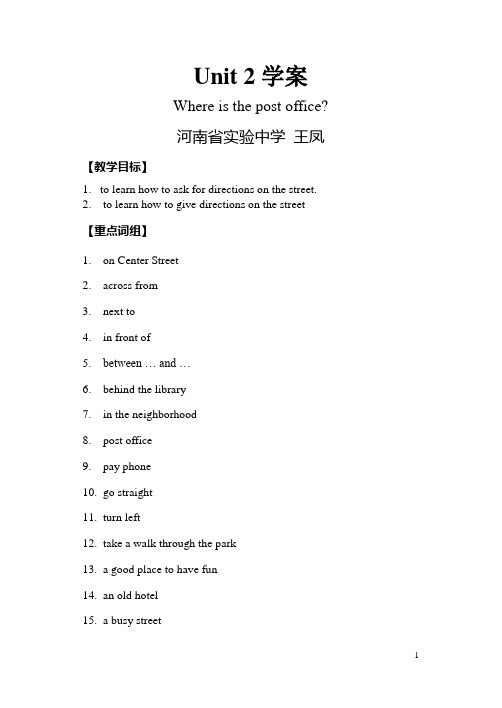
Unit 2学案Where is the post office?河南省实验中学王凤【教学目标】1.to learn how to ask for directions on the street.2. to learn how to give directions on the street 【重点词组】1.on Center Street2.across from3.next to4.in front of5.between … and …6.behind the library7.in the neighborhood8.post office9.pay phone10.go straight11.turn left12.take a walk through the park13.a good place to have fun14.an old hotel15.a busy street16.the way to my house17.on your right【重点句型】1.Is there a bank near here?Yes, there is. It’s on Center Street.2.Where’s the library?It’s between the restaurant and the supermarket.3.Is there a hotel in the neighborhood?4.Just go straight and turn left. It’s down Bridge Street on the right.I t’s next to a supermarket.5.----Thank you very much. / Thanks a lot.----You’re welcome. / That’s all right.6.Next to the hotel is a small house with an interesting garden.7.This is the beginning of the garden tour.8.Bridge Street is a good place to have fun.9.Write a tour guide for your neighborhood.10.Turn left on First Avenue and enjoy the city’s quiet streets andsmall parks.11.If you’re hungry, you can buy some food in the supermarket.12.I know you are arriving next Sunday.13.Let me tell you the way to my house.14.You pass a bank on your right and then go down Long Street.I hope you have a good trip.教学步骤Period One: Section A (1a—Grammar Focus)【重难点解析:】1.post office 邮局2.library 图书馆。
Unit 2学案设计(1-5课时) 2021-2022学年人教版英语七年级上册

Unit 2This is my sister.Period 1Section A 1a~2c【课型】听说课学习目标1.能掌握本课重点词汇即对家庭成员的称呼的词汇:sister,mother,father,parent,they,及指示代词this,that,these,those 等,并能运用who引导的特殊疑问句Who is that?及其答语介绍家庭成员,掌握与介绍人物和辨别人物相关的核心句型和重点词汇及语言结构“Are these your parents?Yes,they are.This is my mother,Jenny,and this is my father,Tom.”等。
2.能基本听懂含有本课重点词汇和目标语言的听力材料。
3.能运用所学的词汇及句型介绍自己的家庭成员。
学习过程【自主学习】再次将前面所学人名巩固复习一下,并且将介绍人物的语言复习一下。
【师生互动】[新课导入]Step 11.Daily greetings.—Hello.What’s your name?—My name is ...2.—Is he Eric?—Yes,he is.—Is she Cindy?—No,She isn’t.She’s Helen.3.—This is...(利用书上出现的人物图片说出名字。
)—Alice.This is Alice.—They are ...—Mike and Tom.They are Mike and Tom.[新知呈现]Step 21.—What’s this in English?—It’s a picture/photo.Can you see this woman?This is my mother.(write the new word “mother” on the blackboard.) She is my mother.2.Finish 1a.You can see a picture of David’s family and some words we learned just now.Please match the words with the people in the picture.[新知学习]Step 3:Listen to 1b1.Play the recording for the first time.Circle the words.Check the answers.2.Play the recording a second time.Pay attention to David’s introductions of his family.3.Listen again and read after it.Step 4:Pair work (work on 1c)1.Practice the conversation in 1b in pairs.2.Role-play the conversation.Take turns to introduce David’s family members.观察与思考11.听力1b中用来指认人物的指示代词有,,等。
人教版英语七年级下册Unit2复习学案(无答案)

第二讲Unit 2 What time do you go to school? 【学习目标】1. 能够熟练地谈论关于日常安排的话题。
2.能掌握并运用关于时间表达和日常活动的短语。
3.能够灵活运用本单元的重点句型和语法点。
【知识梳理】1.请写出你知道的频率副词:(至少3个)2.请写出表达时间的短语:(至少5个)3.请写出关于起居的短语:(至少5个)4.请写出关于饮食就餐的短语:(至少3个)5.请写出关于运动的短语:(至少3个)6.请写出其他日常活动的短语:(至少3个)7.请写出谈论日常活动的问句和答句:(至少2组,用不同的人称)一.新课内容(一)知识点知识点2:重点语法1. get dressed►He can’t dress himself.►I usually dress my daughter before I go to work.【拓展】辨析wear, put on和dress2. From twelve o’clock at night to six o’clock in th e morning.►How far is it from your office to the bank?►We work from morning to night.3.At eleven o’clock, so I’m never late for work.►I’ll ____________(be) late for the meeting.我将开会迟到了。
►Please __________(not) be late for school.请上学不要迟到。
4. In our group, Li Fei usually gets up late on weekends.►My group has some good players.►A group of girls are cleaning the room.5. …so I usually eat very quickly.►The dog runs quickly.►Don’t eat quickly. It’s not a good habit.【拓展】quick adj.快的;迅速的。
译林版英语七年级下册Unit 2 课堂复习学案

7下Unit 2 课堂复习学案一选择题(每小题1分,共15分)( ) 1. ---Mum, what ________ you like _________ for supper? ---I’d like rice and meat.A. do; eatB. shall; eatC. would; to eatD. will; eat( ) 2. Which floor do you live ___________ in this building?A. inB. onC. forD. of( ) 3. ---What time ___________ we ___________ tomorrow? ---At six in the morning.A. will; to meetB. do; meetC. shall; meetD. are; meeting ( ) 4. The song Welcome to Beijing ___________ nice.A. hearsB. soundsC. looksD. listens( ) 5. ---Shall we have a cup of tea? ---___________.A. Good ideaB. Thank youC. That’s OKD. Me too( ) 6. Miss Wu ___________ us with our lessons in the future.A. shall helpB. will helpC. is helpingD. helps( ) 7 There are about ten ___________ working in the police station.A. policemanB. policemenC. postmanD. postmen( ) 8. ---What do you have ___________ your neighborhood?---Supermarkets, restaurants, a school and a hospital.A. ofB. aroundC. aboveD. with( ) 9. I think computers are very useful. we can get ___________ on the Internet.A . game B. information C. idea D. message( ) 10. The man sitting under the tree is my___________. His flat is next to mine.A. neighbourB. visitorC. doctorD. teacher( ) 11. It takes about __________ hour to get to Danyang from Zhenjiang by _________bus.A. an; aB. a; anC. an; /D. a; /( ) 12.The engineers can help you if there is ___________ with your computer.A. anything wrongB.something wrongC. nothing wrongD. no wrong things ( ) 13. Each of the club members ___________ ready to help children in poor areas.A. isB. areC. amD. be( ) 14. There ___________ a football game this afternoon.A. will haveB. is going to beC. hasD. is going to have ( ) 15. Tom, with his classmates, ___________ the windows.A. is cleaningB. are cleaningC. cleaningD. clean( ) 16. --Do you usually go to work by _______ bus?--Yes. I usually go on _____ No. 2 Bus.A./; aB. a; /C. a; aD. the; a( ) 17. --Guess what I want to be when I grow up.--I think you want to be a(n) _____ . You love beautiful things, right?A. engineerB. artistC. nurseD. waiter( ) 18. --The question is so easy.--Maybe it is easy for most of us. But I don't think can answer it.A. someoneB. anyoneC. everyoneD. no one( ) 19. --I must thank Mrs Lee helping me so much _____ my Chinese.--That's true. You are much better at Chinese now.A. with; forB. for; forC. for; withD. of; with( )20. --How long does it take G44 to get to Xuzhou from Nanjing?--Maybe one hour. But why not _____ it on the Internet?A. fixB. seeC. lookD. check( ) 21. --_____ your new job , Jim?--Well, it is usually full of fun. But I have to keep busy.A. How is; likeB. What is; likeC. What does; likeD. How does; like ( ) 22. --Never walk on the left of the road, boy.--Thanks. I next time.A. won'tB. don'tC. can'tD. am not ( ) 23. --Women's Day is coming. I am thinking about ________ to buy for mother.--Good girl! What about a silk scarf for spring?A. howB. whenC. whereD. what( ) 24. --go on a picnic this afternoon? --It can't be better. I can't wait to go out with you.A. What aboutB. Shall weC. Will youD. Do we( ) 25. --Will you come to join us in the trip?--_ . You see, I have to get ready for my coming party.A. Thank youB. I'd love toC. I am afraid notD. All right( )26.Our teacher asks us English every day.A . read B. reads C . to read D. reading( ) 27. What about ______ our party ?A. beginsB. beginningC. beginD. to begin( )28. Millie is a good swimmer, and she can swim _______ a fish.A. likesB. is likeC. likeD. is likes( )29 .I can speak English ________, I am ______ at it.A. good, wellB. good, goodC. well, wellD. well, good()30. They will arrive _______ Beijing _______ April 20th.A. in; inB. at; atC. in; onD. at; on二、完形填空(每小题1分,共10分)Dear Miss Green,I'm happy to invite you to a welcome party for our new teacher from the USA.We’ll 1 the party in Sunshine Park from 8 to 11 2 Saturday evening, March 10. We’ll 3 at the party gate. We will have a picnic in the 4 . We would like everybody to bring 5 own food and drinks. We’ll also 6 different ball games. Let me tell you the way to Sunshine Park. It will be easy to get to the park 7 your building. Just turn left at the building. Walk straight on and you’ll see a bus stop on your right. 8 a No.8 bus and get off it when it comes to the second stop. Then you will see Sunshine Park in front of you. You can’t miss it. We 9 you can come. We hope to see you at our 10 .( ) 1. A. make B. hold C. take D. put( ) 2. A. at B. on C in D. about( ) 3. A. see B. look C. play D. meet( ) 4. A. office B. park C. school D. home( ) 5. A. her B. our C. your D. their( ) 6. A. do B. play C. take D. spend( ) 7. A. to B. of C. from D. in( ) 8. A. find B. carry C. take D. bring( ) 9. A. hope B. need C. want D. like( ) 10. A. park B. school C. home D. party三、阅读理解(每小题2分,共12分)(A)Dear Mum,I’m sorry that I can’t go back home for Mother’s Day next week. On that day, I’ll have to go to an important meeting for my boss, who helps me a lot with my work and life here. But I’ll find time to see you at home soon.Mum, thank you for everything you’ve done for Tim and me. After Dad died ten years ago, you had to work in a supermarket in the daytime and in a restaurant at night. But you always gave us two your love and care. Though you don’t have to work now, I still remember your coming home and feeling tired many evenings.Tim is going to finish his studies next month. He said he would move back from school and look for a job near home. I’m glad you won’t live by yourself any more. Let’s plan to take a trip in the near future. Happy Mother’s Day, I love you, Mom.John( ) 1. How many jobs did the mother take after her husband died?A. One.B. None.C. Two.D. Three.( ) 2.Why can’t John go back home for Mother’s Day?A. Because he doesn’t like his mother.B. Because his brother can come back home.C. Because he has something important to do.D. Because they never celebrate Mother’s Day. ( ) 3. What can we learn about John’s mother?A. She lives by herself now.B. She still works day and night.C. She will make a plan to save money.D. She couldn’t look after her children.(B)A school party will be held on Sunday evening. The girls are talking about clothes.“I shall wear a black dress, so everybady will notice me,”says Emily. “What aboput you, Linda?”“I am not sure. Maybe I'll wear jeans, an old skirt and a hat.People will notice me, too!”Linda says.“What shall we do about the boys?” says Jane.“I hear that some of boys learn to dance better this summer. Maybe it'll be better this time,” says Mary.It is Sunday evening. Groups of students arrive. The music begins, The girls stand in a line on one side, and the boys on the other side. Mr Green, their teacher, tries to get them together, but fails. After a while Tim says,“I don't want to stand here the whole time. The party is only for two hours. it'll be over soon.”He starts to dance. All the others watches him. Then David asks Emily if she wants to dance. Then Jack and linda. Then all begin to dance. Soon there are more dancers than watchers.4 .On Sunday evening,________ will be held.A. a birthday partyB. a dance competitionC. a school partyD. a school meeting5. When does the music begin?A.Tim says something.B. Some students start to dance.C. The girls stand in a line on one side and the boys on the other side.D. Groups of the students arrive.6.. What does Tim really mean?A. Students should start to dance.B. students should stand the whole time.C. The party will last two hours.D. He will leave the party quickly.CAll students need to have good habits(好习惯):When you have good study habits, you learn things quickly. You also remember them easily.Do you like to study in the living room? This is not a good place because it is usually too noisy. The telephone bell rings there; the TV is there, and sometimes it is a good place for your pet dog or cats to play and rest. You need to study in a quiet place, like your bedroom. A quiet place will help you only think about one thing, and you will learn better.Before you begin to study, do not forget to clean your desk. A good desk light is important, too. You’ll feel tired easily if there is not enough light. So you should have a clean and bright lamp. To tell you the truth, the most important is that you should put your heart into your study.7.When you have good study habits, you will __________.A . learn things quickly B. remember things easily C . think about one thing D. both A and B8. You'll feel tired easily if the light is __________.A. goodB. enough C . bad D. wonderful9.You should remember to _________ before you study.A. clean the deskB. tidy the roomC. turn on the lightD. go to the bedroom10.The best title (标题) for this passage (文章) is __________.A. Study in the bedroomB. Good study habitsC. How to studyD. Desk light is important四看音标写单词(每小题1分,共10分)1.[ʹbrəʊkən]________________2. [ʹeniwʌn]__________________3.[ʹfjuːtʃə(r)____________4.[ʹlʌki]_____________5.[ʹkɒlɪdʒ]_____________6[ʹnəʊtɪs]_________7[sɪk]____________8 [ʃəl]___________9[tʃek]______________10 [ʹvɪzɪtə(r)]_______________五词汇(每小题1分,共10分)A2. Eating too much sea food makes me .3. A mother often about her child's safety(安全) very much.4. Jim often helps his neighbor, an 80-year-old man, do some ________________________.5. Both my parents are office in the town.B)用所给词的适当形式填空。
人教英语七年级下册Unit2词汇学案(无答案)

Unit2 词汇学案1. up /ʌp/ adv.向上up 副词,意为“向上”反义词:downup and down 来来回回,往返地;look up and down 上下打量___________________ 养育___________________ 建立___________________ 熬夜___________________ 想出;提出___________________露面;出现pick up , put up give upget up意为“起床”,反义词组:go to bedget 得到;拿;取;理解----getting(动名词)get up 起床get to到达get home到家get on上车get off 下车get dressed穿衣get out出去get back回来get together相聚get ready for为……做准备get married结婚2.dress/dres/ v.穿衣服n.连衣裙This is my sister's dress. Someone can’t be valued only from his dress.The boy can dress himself. to dress a shop windowdress作及物动词时,其后要跟表示人的名词、代词或反身代词作宾语,给某人穿衣服/自己穿衣服,其后不能跟衣服或鞋帽。
get dressed是固定搭配,意为“穿上衣服”。
be dressed in(=wear)穿着……衣服;dress up 装扮;dress up as 乔装打扮成;dress sb. in给某人穿上……衣服①Though the little boy is young, he can dress _______(he)without anyone's help.②He likes to ___________(乔装打扮成)Santa Claus to give away presents to children.③The girl ___________(穿着)her new dress, so she moves very carefully to avoid getting her new dress dirty.3.brush /brʌʃ/ v.刷;刷净n.刷子We gave him paint and brushes.The little girl drew a beautiful picture with a brush.After getting dressed, she usually brushes her teeth first.He brushed his tears away and smiled.toothbrush hairbrush4.tooth /tuːθ/ n.牙齿___________________ 复数___________________ 合成词(牙痛)___________________ 合成词(牙刷)___________________ 刷牙拓展:1)一些名词的复数是不规则变化的。
人教(精通)三年级上册英语教学设计:Unit2 lesson7
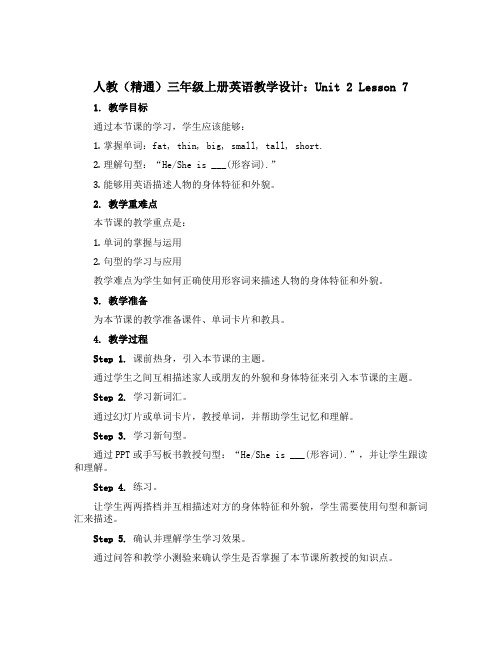
人教(精通)三年级上册英语教学设计:Unit 2 Lesson 7
1. 教学目标
通过本节课的学习,学生应该能够:
1.掌握单词:fat, thin, big, small, tall, short.
2.理解句型:“He/She is ___(形容词).”
3.能够用英语描述人物的身体特征和外貌。
2. 教学重难点
本节课的教学重点是:
1.单词的掌握与运用
2.句型的学习与应用
教学难点为学生如何正确使用形容词来描述人物的身体特征和外貌。
3. 教学准备
为本节课的教学准备课件、单词卡片和教具。
4. 教学过程
Step 1.课前热身,引入本节课的主题。
通过学生之间互相描述家人或朋友的外貌和身体特征来引入本节课的主题。
Step 2.学习新词汇。
通过幻灯片或单词卡片,教授单词,并帮助学生记忆和理解。
Step 3.学习新句型。
通过PPT或手写板书教授句型:“He/She is ___(形容词).”,并让学生跟读和理解。
Step 4.练习。
让学生两两搭档并互相描述对方的身体特征和外貌,学生需要使用句型和新词汇来描述。
Step 5.确认并理解学生学习效果。
通过问答和教学小测验来确认学生是否掌握了本节课所教授的知识点。
5. 教学拓展
为了拓展学生的学习内容,可以给学生安排阅读课外读物,并引导他们描述书中人物的外貌和身体特征。
6. 总结
本节课的教学重心在于帮助学生掌握新的句型和单词,并使他们能够用英语正确地描述人物的身体特征和外貌。
同时,教师也应该重视与学生的互动和回馈,以确保学生能够获得充分的学习效果。
Unit2单词讲解学案-高中英语人教版选择性

高一英语导学案BOOK4 unit 2 words studyReading and thinkingKey words1. foundation 基础;基本原则;根据Lianda laid the foundation for every achievement I have made,” Yang Zhenning recalled.“联大为我取得的每一项成就奠定了基础”,杨振宁回忆道。
2. 创建;创办(establishment):the foundation of the first university3.[常用复数]地基;房基:How long will it take to finish digging the foundations? 挖地基4.基金会:Children’s Foundation of China中国儿童基金会[知识拓展]①给…打下基础;为…奠定基础lay the foundation for...eg. Your breakfast choices lay the foundation for your entire day and your long-term health.②无根据的without foundationeg. The universities' concern is not without foundation. 大学的担忧并不是没有根据的found v. 建立;创立;创办;为(房屋等)打基础;注意:find 的过去式和过去分词是found;found的过去式和过去分词是foundedThey invested a lot of money to found a research institute. 建立研究院The house is founded on rock.founder n. 创办人;创立者2.politics n. 政治,政治事务(活动) politician n. 政治家,从政者politicise vt. 使政治化,使具有政治性3.located adj 位于be located in/on = be situated in/on 坐落于城市,位于中国东部沿海地区。
九上外研版M7U2学案

Module 7 Great books Unit 2 It is still read and loved.By Shan TingtingObjectives:1.Knowledge aim:To manage some key words and useful expressions.adventure/ escape / cave / dead / neighbour / funeral / surprised / alive / southern / state / action / everyday/ dialogue / get into trouble / run away /for a time / be surprised to / pay for2. Ability aim:1) Read to get the brief information of the book The Adventures of Tom Sawyer2)Be able to write about a favourite book.3. Emotion aimFall in love with reading.Part One. Before Reading.Mark Twain and his works:The Adventures of Tom Sawyer, The Prince and the Pauper, The Adventures of HuckleBerry FinnPart Two. While Reading.1.Fast Reading.Step1. (1)Who wrote the passage?A.Mark TwainB.A reader of The Adventures of Tom SawyerTips: When we read a passage, pay attention to the title/topic,it's a good way to help you to get the main idea of the passage.Step2. Listen first, then read the passage in 2 minutesMatch the main idea with each paragraph.Para1 a. main charactersPara2 b. a brief introduction of the storyPara3 c. the theme(主题) and features(特点)of the storyPara4 d.the writer's favourite part2.Careful Reading.(1)Read Para1 and answer the following questions1. What kind of story is The Adventures of Tom Sawyer?__________________________________________2.When and where is the story set?__________________________________________(2)Para2 Reading.1.Who is the hero of the story? What kind of person is he?_________________________________________________2. Why does Tom always get into trouble?________________________________________________3.Who are the characters in the story according to this paragraph?______________________________________________________4..Correct the mistakes.①Tom runs away with his best friend Huck Finn to a cave.②Tom escapes from a cave with his friend Injun.5.What does Tom find at last?(3)Read Para 3 and answer these questions.1.Why did Tom and Huck come back home?____________________________________________2.People feel ___ when Tom appears at his own funeral.A. surprised and pleasedB. worried and sadC. angry and excitedD. funny and interesting(4)Para 4 Reading.1.What does The Adventures of Tom Sawyer describe?___________________________________________2.What's the theme of the story?___________________________________________3.What's the language feature of the story?Part3. After Reading.Would you like to read The Adventure of Tom Sawyer? Why/Why not?Part4. Enjoy some sentences~~~~1.He always gets into trouble.2.Everyone is surprised to see them at first, but very pleased to find that they are alive.3. It is more than an adventure story.4.Today, it is still read and loved by people all over the world.5.It is thought to be one of the greatest American stories.Translate the sentences:1.如果你遇到麻烦,给我打电话。
高中英语必修三Unit2单词学案

Book3 Unit2 单词学案课前自主学习名言:1. Early to bed and early to rise, makes a man healthy, wealthy and wise . 早睡早起,使人健康、富裕又聪明。
— B. Franklin2. Diet cures more than doctors . 自己饮食有节,胜过上门求医。
3. An apple a day keeps the doctor away. 一日一苹果,医生远离我。
4. After dinner sit a while , after supper walk a mile .午餐以后,休息片刻;晚餐以后,步行一里。
5. Rest, good cheer and moderate diet are the three best doctors.休息、愉快和节食是三大良医。
6. The best doctors in the world are doctor Diet, Doctor Quiet , and Doctor Merry. .最好的医生就是饮食、安宁和快乐。
课内探究1diet n. 日常饮食& v. 节食补充:胃口appetitea balanced diet ____________ be on a diet/ go on a diet ____________put sb. on a diet 使某人节食翻译:①Poor diet can affect the baby. 饮食不良会影响婴儿。
②Most of the diets just don’t work. _________________________________.③You are too fat, you should diet and keep fit.___________________________。
④我正在节食。
四年级上册英语优秀学案-Unit 2 Lesson7 Homework| 冀教版(三起)
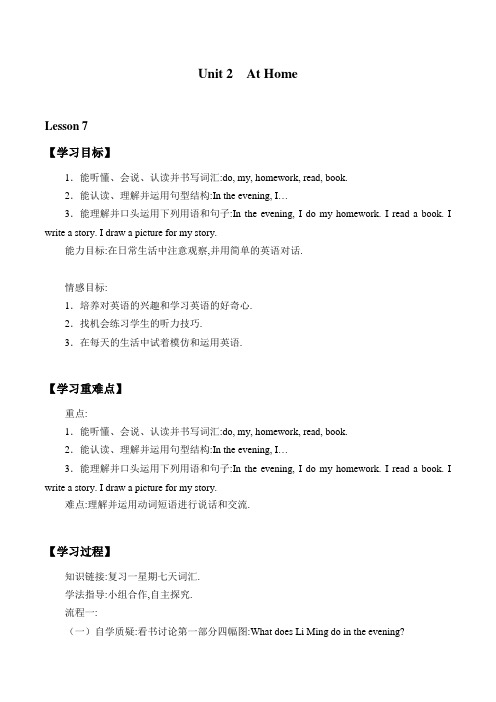
Unit 2 At HomeLesson 7【学习目标】1.能听懂、会说、认读并书写词汇:do, my, homework, read, book.2.能认读、理解并运用句型结构:In the evening, I…3.能理解并口头运用下列用语和句子:In the evening, I do my homework. I read a book. I write a story. I draw a picture for my story.能力目标:在日常生活中注意观察,并用简单的英语对话.情感目标:1.培养对英语的兴趣和学习英语的好奇心.2.找机会练习学生的听力技巧.3.在每天的生活中试着模仿和运用英语.【学习重难点】重点:1.能听懂、会说、认读并书写词汇:do, my, homework, read, book.2.能认读、理解并运用句型结构:In the evening, I…3.能理解并口头运用下列用语和句子:In the evening, I do my homework. I read a book. I write a story. I draw a picture for my story.难点:理解并运用动词短语进行说话和交流.【学习过程】知识链接:复习一星期七天词汇.学法指导:小组合作,自主探究.流程一:(一)自学质疑:看书讨论第一部分四幅图:What does Li Ming do in the evening?(二)合作释疑:播放光盘录音,跟读.讨论:What do you do in the evening?(三)展示评价:选择搭档并互相提问在家里都做什么.尽量使用新学的短语:do my homework, read a book, draw a picture, write a story.(四)巩固深化:用大写形式将下列句子写在作业本上:I READ MY BOOKI WRITE A STORYI DRAW A PICTUREI DO MY HOMEWORK复习句子,大声念出来.做动作.流程二:(一)自学质疑:打开课本,看游戏内容.(二)合作释疑:分组做游戏.(三)展示评价:展示结果.流程三:歌曲学习.流程四:(一)自学质疑:阅读第四部分.(二)合作释疑:分组做游戏.(三)展示评价:小组表演.【达标检测】填空:What do you do in the evening?I _____ my homework.I _____ a book.I _____ a story.I _____ a picture for my story.课堂小结:What have you learned today? 复习今天所学知识.Lesson 11 Always do your homework.一、教学目标:1、知识目标:学生掌握四会词always ,usually ,sometimes ,never及triangle ,circle ,square ,line;学生能理解Let’s put …for …的意义;2、能力目标:学生会运用句型Do you always …? 来调查身边同学做某事的频率,提高口语表达能力,并能根据调查结果绘制图表。
初一英语鲁教版新教材unit2学案
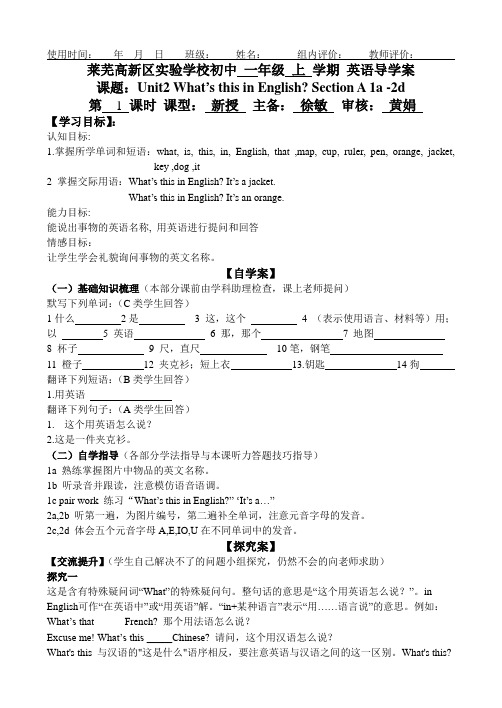
使用时间:年月日班级:姓名:组内评价:教师评价:莱芜高新区实验学校初中一年级上学期英语导学案课题:Unit2 What’s this in English? Section A 1a -2d第 1 课时课型:新授主备:徐敏审核:黄娟【学习目标】:认知目标:1.掌握所学单词和短语:what, is, this, in, English, that ,map, cup, ruler, pen, orange, jacket,key ,dog ,it2 掌握交际用语:What‟s t his in English? It‟s a jacket.What‟s t his in English? It‟s an orange.能力目标:能说出事物的英语名称, 用英语进行提问和回答情感目标:让学生学会礼貌询问事物的英文名称。
【自学案】(一)基础知识梳理(本部分课前由学科助理检查,课上老师提问)默写下列单词:(C类学生回答)1什么2是 3 这,这个 4 (表示使用语言、材料等)用;以 5 英语 6 那,那个7 地图8 杯子9 尺,直尺10笔,钢笔11 橙子12 夹克衫;短上衣13.钥匙14狗翻译下列短语:(B类学生回答)1.用英语翻译下列句子:(A类学生回答)1.这个用英语怎么说?_________________________________________________________2.这是一件夹克衫。
_____________________________________________________________ (二)自学指导(各部分学法指导与本课听力答题技巧指导)1a 熟练掌握图片中物品的英文名称。
1b 听录音并跟读,注意模仿语音语调。
1c pair work 练习“What‟s this in English?”…It‟s a…”2a,2b 听第一遍,为图片编号,第二遍补全单词,注意元音字母的发音。
牛津译林版 英语 7B Unit2 语法一般将来时学案设计+练习(含答案)
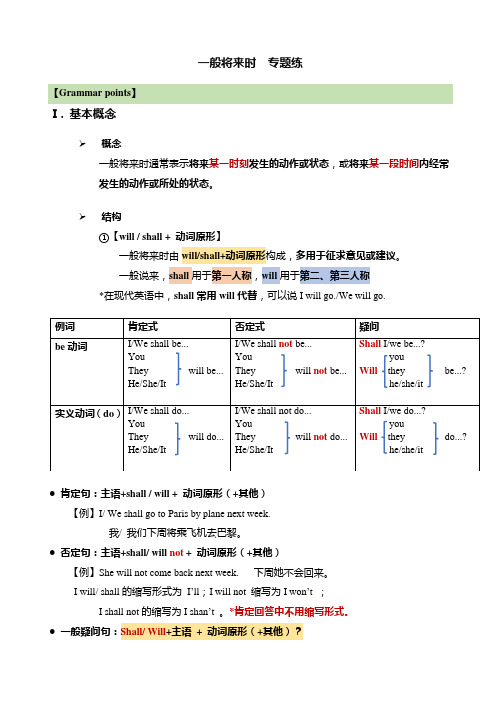
一般将来时专题练【Grammar points】Ⅰ. 基本概念➢概念一般将来时通常表示将来某一时刻发生的动作或状态,或将来某一段时间内经常发生的动作或所处的状态。
➢结构①【will / shall + 动词原形】一般将来时由will/shall+动词原形构成,多用于征求意见或建议。
一般说来,shall用于第一人称,will用于第二、第三人称*在现代英语中,shall常用will代替,可以说I will go./We will go.●肯定句:主语+shall / will + 动词原形(+其他)【例】I/ We shall go to Paris by plane next week.我/ 我们下周将乘飞机去巴黎。
●否定句:主语+shall/ will not + 动词原形(+其他)【例】She will not come back next week. 下周她不会回来。
I will/ shall的缩写形式为I’ll;I will not 缩写为I won’t ;I shall not的缩写为I shan’t 。
*肯定回答中不用缩写形式。
●一般疑问句:Shall/ Will+主语+ 动词原形(+其他)?【例】Will you be at home tonight? 今晚你会在家吗?●特殊疑问句:特殊疑问词+shall/ will+主语+ 动词原形(+其他)?【例】What will you do next weekend? 下周末你将做什么?②【be going to + 动词原形】表示计划、打算做某事,表示已决定的并很可能发生的事。
*be going to相当于一个助动词,与后面的动词原形一起构成谓语be动词的形式随主语的人称和数可变为am,is或are。
●肯定句:主语+be going to + 动词原形...【例】Jack is going to buy a car. 杰克打算买一辆汽车。
八年级英语下册 Unit2学案 人教新目标版
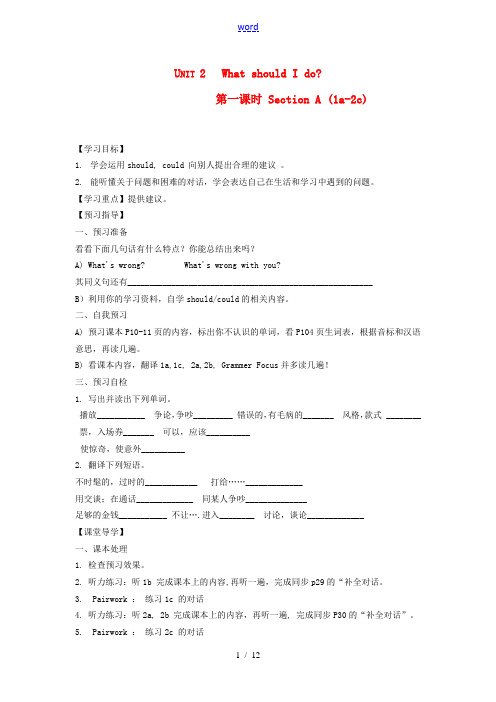
U NIT 2 What should I do?第一课时 Section A (1a-2c)【学习目标】1.学会运用should, could 向别人提出合理的建议。
2.能听懂关于问题和困难的对话,学会表达自己在生活和学习中遇到的问题。
【学习重点】提供建议。
【预习指导】一、预习准备看看下面几句话有什么特点?你能总结出来吗?A) What's wrong? What's wrong with you?其同义句还有________________________________________________________B)利用你的学习资料,自学should/could的相关内容。
二、自我预习A) 预习课本P10-11页的内容,标出你不认识的单词,看P104页生词表,根据音标和汉语意思,再读几遍。
B) 看课本内容,翻译1a,1c, 2a,2b, Grammer Focus并多读几遍!三、预习自检1. 写出并读出下列单词。
播放___________ 争论,争吵_________ 错误的,有毛病的_______ 风格,款式 ________ 票,入场券_______ 可以,应该__________使惊奇,使意外__________2. 翻译下列短语。
不时髦的,过时的____________ 打给……_____________用交谈;在通话_____________ 同某人争吵______________足够的金钱___________ 不让….进入________ 讨论,谈论_____________【课堂导学】一、课本处理1. 检查预习效果。
2. 听力练习:听1b 完成课本上的内容,再听一遍,完成同步p29的“补全对话。
3. Pairwork :练习1c 的对话4. 听力练习:听2a, 2b 完成课本上的内容,再听一遍, 完成同步P30的“补全对话”。
5. Pairwork :练习2c 的对话二、讲练互动参考同步p301 should是________的过去式,用作情态动词时,并不表示_______的动作,只是语气显得更加________。
Unit2 Robots 复习学案--2020-2021学年高二英语人教版选修七

高二级英语M7U2 RobotsM7U2 复习学案A 课前作业班级:____________姓名:____________学号:______________一、重点单词复习desire n.渴望;欲望;渴求;渴望的人或物(1)Greatness comes from a lasting desire (explore).(2020·天津)(2)He desired (bring) the so-called new four inventions back to his home country.favour n.喜爱;恩惠;帮忙;偏爱(1)Do me favour and turn the radio down while I am ringing up, will you?(2)When circumstances are (favour), we must not forget that there will still be difficulties.accompany vt.陪同, 陪伴;伴随, 与……同时发生;为……伴奏(1)What's more, I have accumulated related experience by working part-time in a travel agency, (accompany) some foreign tourists.(2018·浙江)(2)While she was singing on the stage, her mother was accompanying her the piano.(3)She a posted a photo of the chance meeting on a social networking website(accompany) by the touching words.(2018·全国Ⅲ)(4)Children, when (accompany) by their parents, are allowed to enter the stadium.leave...alone不管;别惹;让……一个人待着;和……单独在一起(1)She's asked to be left but the press photographers follow her everywhere.(3)I'm leaving Vienna to visit my children, who have been away from me for three months.二、单词拼写1.It was a reasonable (评估) and probably pretty close to the truth.2.If it weren't for Jeff's quick (思考), Tillie could have been badly hurt.3.South African students like eating fast food so they are (超重).4.While I have some (同情) for them, I don't think they are right.5.David's parents when he was six, which had a bad influence on his childhood.6.You will be severely punished if you do not the rules in the famous university.7.The instant the president (宣布) the celebration open, the crowd cheered.8.As you know, the Spring Festival in China is a (盛大的) festival, which we Chinese celebrate cheerfully.三、写作增分练——提升语用能力1.在场的所有学生都渴望上重点大学。
仁爱版初一英语上册教学案Unit2

Unit2 Topic1 Section A学习目标:1.复习who提问的句型。
2学习单词:head hair eye ear nose mouth face bigwide small long round short3.掌握have/has的用法。
学习重点和难点:1.have/has的用法。
2 .学习新单词。
学习过程:1.自主学习A:Who are you?B:I’m …A:Who is he/she?B:He/She is…2.合作交流,语言点导学(1)I have a small nose,but he has a big one.我长着一个小鼻子,但他长着一个大鼻子。
has是have的第三人称单数,当主语是she,he,it时用has;当主语是I,you,we,they时用have.如:Kangkang has big eyes.I have a small mouth.(2) She has long hair .她留着长发。
long hair 前没不定冠词a,因hair是不可数名词,它没单复数,不用a/an.学习巩固1.单项选择(1)He ____a big head.A.has B.have C.is(2)Mr.Lee has ____short hair, ____small nose and ____wide mouth.A.a;a;aB.a; the; /C./; a; a(3)His____are small, but his nose is big.A.hair B.eyeC.ears(4) ------ Are you Li Ping?------Yes,_________.A.he’sB.you’re rightC.I’m(5)This is my friend.____nose is big. A.He B.His C.She(6)-----Is he Kangkang?------____________.A.Yes, he is.B.Yes, he isn’t.C.No,he is.年级: 七年级科目:英语内容:Topic1SectionB学习目标:1 学习人体各部分名称,能够描述自己的外貌特征;2 熟练使用have/has陈述,疑问和回答。
2021版牛津译林必修一 UNIT 2 重点知识解析(学案)

Unit 2 Let's talk teens一、单元词性转换根据词性和汉语提示,写出下列单词1.argue vi.争吵,争辩,争论vt.说理,论证→____________ n.争吵,争论;论点2.____________ adj.忧虑的,担心的;令人焦虑的,渴望的→anxiety n.担心;焦虑;渴望3.____________n.怒气,怒火→angry adj.生气的;恼火的4.concern n.担心,忧虑;关心vt.涉及;让(某人)担忧→____________ adj.担心的;忧虑的5.edit v.编辑→____________n.主编,编辑;剪辑师→edition n.版(本);版次6.____________n. 精神压力,紧张;强调vt.强调,着重→stressful adj.压力重的;有压力的7. perform v.做,履行,表演,表现→____________n. 表现;表演;执行,履行→performer n. 执行者,演奏者8.____________vt.&vi. 催促,逼迫;按,压;挤,推→pressure n. 压力,,气压9.____________adj.安心的;可靠的;牢固的→security n.安全,保护措施,保卫部门10.____________vt.&vi. 毕业n. 毕业生→graduation n.毕业11.____________vt.&vi. 自愿做,义务做n. 志愿者→voluntary adj.自愿的,自发的,志愿的→voluntarily adv.自发地,志愿地,自发地12.operate v.操作,经营,动手术→____________n. 手术;运转,操作→operator n. 经营者。
操作员13. respond v.回复,答复→____________n. 回复;反应,响应二、重点单词及短语1.shoot vt.&vi.(使朝某方向)冲,奔;射击;射杀;摄影,拍摄①Smith killed his wife,and then shot himself. ____________②The movie was shot in New Zealand. ____________③They had almost reached the boat when a figure shot past them. ____________2.spot n.粉刺,脓包;斑点;污渍;地点,场所①She was wearing a black skirt with white spots. ____________②His jacket was covered with spots of mud. ____________③The baby's whole body was covered in small red spots. ____________④He showed me the exact spot where he had asked her to marry him. ____________3.view n.&vt.看法;视线;景色;把……视为;观看①This evidence supports the view that there is too much violence on television.__________②The sun disappeared from view. ____________③The view from the top of the tower was wonderful. ____________④The law should be viewed as a way of meeting certain social goals. ____________4.anxious adj.忧虑的,担心的;令人焦虑的;渴望的(教材P16)You may feel anxious that you are developing at a different rate to your friends,shooting up in height or getting left far behind.【相关知识】(1)be anxious for/about(=be worried/concerned about)为……担心/担忧be anxious for(=be eager for/be keen on) 渴望……be anxious (for sb.) to do sth. 渴望(某人)做……be anxious that... 渴望…(从句谓语用should do,should可以省略)(2)anxiously adv. 焦躁地;急切地(3)anxiety n. 担心;焦虑;渴望【即学即练】单句语法填空①We were anxious for everyone ____________ (know) the truth.②We waited with ____________ (anxious) for the news of her safe arrival.③She is anxious about not ____________(pass) the College Entrance Exam.④More and more people are ____________(anxiety) for the quality of the air.5.target n.(攻击)目标,对象;靶子vt.把……作为攻击目标;面向(教材P16)When it all gets too much,your parents are often the first targets of your anger.【相关知识】(1)set a target =set a goal设定目标aim at the target 瞄准目标hit/miss the target 中/脱靶(2)target sth.on/at = aim at 把……对准be targeted on/at =be aimed at 以……为目标;把……对准;旨在【即学即练】单句语法填空①Set yourself ____________(target) that you can reasonably hope to achieve.②This TV show is mainly ____________(target) on the young.③To hit ____________ target,you have to aim at it.④We were still right on target ____________our deadline.6.struggle n.& vi.斗争;拼搏;努力(教材P17)On the other hand,when you are struggling to control your feelings,you wish they could be more caring and patient-sometimes they forget that growing up is a rough ride.【相关知识】struggle against/with sb./sth. 同……做斗争;与……抗争struggle for sth. 为……而斗争struggle to do sth. 努力去做某事;挣扎着做某事struggle to one's feet 挣扎着站起来【即学即练】单句语法填空①They had to struggle ___________ all kinds of difficulties.②I could see the young boy ___________(struggle) to free himself.③The young man struggled___________ his feet to fight against the robber.④He has been struggling___________ success in his business.7.calm vt.使平静;使镇定;adj.平静的;镇静的;沉着的(教材P17)When you disagree with your parents,take a minute to calm down and try to understand the situation from their point of view.【相关知识】(1)calm down平静下来;镇静下来calm sb.down 使某人平静下来(2)stay/remain/keep calm 保持镇静(3)calmly adv. 平静地;镇静地;沉着地【即学即练】1)We waited inside until things calmed ___________.2)He took a few deep breaths ___________(calm) himself down.3)She gazed ___________(calm)back at the queen.4)If I feel anxious,I know what to do to calm ___________(me) down.5)试着保持冷静,告诉我发生了什么。
人教新目标七年级英语上册Unit2 导练学案设计

人教新目标七年级英语上册Unit2 导练学案设计- Unit 2教学目标:七上Unit 2 共8个知识点21个例题8道习题本专题主要内容:知识点1:family的用法例题1.There are five people in my family.2.His family are all tall.3.The decide to start a family.练习His family_____all waiting for him.(D)A.beB.amC.isD.are知识点2:be动词例题1.I am very happy today.2.He is my best friend.3.They are my parents.练习——Are those your parents?——No.______are my uncle and aunt.(D) A.He B.She C.You D.They知识点3:here和there引导的倒装句例题1.Here you are.2.Here are the photos.练习Here_____two yellow jackets.(C)A.amB.isC.areD.be知识点4:双重所有格例题1.a friend of mine2.some photos of Lucy’s练习——This is a photo______my family.——It is nice.(C)A.inB./C.ofD.at知识点5 in的用法例题1.It is warm in spring.2.Can you say it in English?3.Your book is in the box.练习You can see a girl_____this photo.(B)A.on B.in C.to D.for知识点6 人称代词例题1.She works in a hospital.2.My mother likes her very much.3.You, she and I all enjoy computer games.4.The baby is lovely——is it a boy?练习I like to play with_____.(C)A.sheB.heC.herD.his知识点7 who引导的特殊疑问句例题1.——Who’s he?——He is John.2.Who isn’t at school today?练习——_________ is your English teacher?(B)——Miss Liu is my English teacher.A.whenB.whoC.How知识点8 this与that; these与those例题1.My book is here and yours is over there.2.These books are Lucy’s and those are yours.练习______are my books. They are cheep. They are over there.(D) A.This B.These C.That D.Those综合练习作业。
- 1、下载文档前请自行甄别文档内容的完整性,平台不提供额外的编辑、内容补充、找答案等附加服务。
- 2、"仅部分预览"的文档,不可在线预览部分如存在完整性等问题,可反馈申请退款(可完整预览的文档不适用该条件!)。
- 3、如文档侵犯您的权益,请联系客服反馈,我们会尽快为您处理(人工客服工作时间:9:00-18:30)。
东平明湖中学高二英语学案【学习目标】:the usage of the words and expression in this unit.【学习重点】:Teaching important and difficult points.Develop students’ability of making up sentences.一、重点单词。
1. Do you think it is possible for a robot to have its own needs and desires?【语境运用】(1) She has a strong desire for knowledge and wants to go to college very much.(2) There are several things that I desire to say.(3) He desires that you should see him immediately.(4) We all desires happiness and health.(5) She desires to marry a rich man.【归纳拓展】(1) n.(2) v.【实践演练】(1) He _____________________________ succeed. 他急切渴望成功。
(2) The teacher desires me to come to school on time.= The teacher __________________________________________ to school on time.(3) He hopes we can leave soon.= He _____________________________________ soon.2. However, when she first saw the robot, she felt alarmed.【语境运用】(1) The doctor said that there was no cause for alarm.(2) The guard sounded the alarm as soon as he saw the smoke.(3) Everybody was alarmed at/by the news that war might break out.(4) She cried out in alarm.【归纳拓展】(1) n.(2) v.(3) adj.【实践演练】(1) A small boy saw the smoke and ______________________. (发出警报)(2) ___________________; (不要慌) he is not a robber.(3) She turned _________________ (惊慌地) when the door opened.3. Claire thought it was ridiculous to be offered sympathy by a robot.【语境运用】(1) I have a lot of sympathy for him; he brought up his two children on his own.(2) We are in sympathy with your stand on lower taxes.(3) He gave the poor child much help out of sympathy.【归纳拓展】(1) n.(2) v.(3) adj.【实践演练】(1) After hearing her story, he ________________________ (对…深表同情) her present situation.(2) They looked at the begging orphan _________________ (同情地).(3) The leaders went on strike _____________________ (支持) the workers.(4) ______________ (出于同情)for the homeless children he has them sheltered for the night.4. As a favour Tony promised to help Claire make herself smarter and her home more elegant.【归纳拓展】(1) Personally, I favor the latter one.(2) Are you in favor of the decision?(3) You did me a great favor.(4) I will consider everything in your favor.【语境运用】(1) 帮某人的忙________________________赞成,支持______________________(2) 请求某人帮忙_________________________【实践演练】(1) May I ______________________________________? (请你帮个忙吗?)(2) We are all ___________________________ (赞成) the plan.(3) The mother is careful to __________________________ (不偏袒) any child.(4) I think doing such things is ___________________________ (对我们有好处)。
5. She cried out “Tony” and then heard him declare that he didn’t want to leave her the next day…【语境运用】(1) The government has declared a state of emergency(紧急).(2) The doctor declared that the woman was dead.(3) The use of certain chemicals has been declared illegal recently.【归纳拓展】(1) declare for/against…____________________(2) declare sb/sth (to be) + n/adj _______________(3) declare that…______________________(4) 对…宣战declare ____________________①She ______herself extremely hurt by her lack of support.她说自己非常伤心,因为没有得到支持。
②(朗文P523)The United States _______its independence from Britain in 1776.美国于1776年正式宣布脱离英国而独立。
③(朗文P523)The time has come to ______________cancer.是该向癌症宣战的时候了。
④When they asked him for his opinion,he __________ the policy.他们向他征求意见时,他声明强烈反对这项政策。
二.重点短语:6. .turn around =turn round 转过身与turn有关的短语:turn back 折回, 翻回上交___________拒绝, 调小/低________________ 结果是; 生产______________turn on/off_________________ 出现;到达_________________向某人求助______________________________7..leave...alone不管;别惹;让…一个人待着;和…单独在一起She shouted “Leave me alone” and ran to her bed.她高声嚷着:“让我独自待一会儿!”然后就跑上了床。
归纳拓展leave behind 遗留;把……抛在后面;超过leave aside 搁置一边__________动身到……省略;遗漏_____________留下;剩下____________【实践演练】①I’ve told you to___________________.Why can’t you leave me alone?我已经告诉你别管我的事情。
为什么你不让我一个人待着?②___________ ,or you’ll break it.别碰它,否则你会把它弄坏的。
③It was careless of him to _____________ an important detail.他真粗心,漏掉了一个重要细节。
8. set aside将……放在一边;为……节省或保留(钱或时间)(教材P13)He felt happy when his boss stated that he could set aside some time for exercise. 可以留出时间运动的时候,他感到很高兴。
归纳拓展_______________着手做某事set down _________________________set off ________________ set out_______________________set up ______________________①(牛津P1823)She tries to set aside some money every month.她每个月都尽量存点钱。
②(牛津P1823)Let’s set_aside my personal feelings for now.目前咱们就不要顾及我的个人感情了。
③(全国高考)I think we ought to_______ at 7∶00,while the roads are empty.7点出发,趁那时道路畅通无阻。
④For all three years I have been working for others,I’m hoping I’ll ________my own business someday.三年来我一直为他人工作,我希望有一天我能建立自己的事业。
